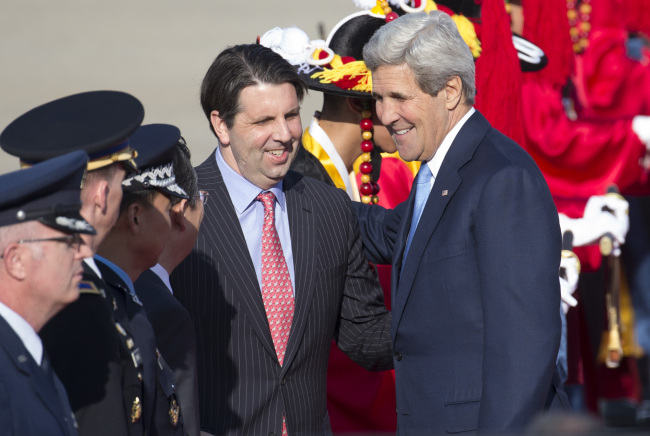U.S. Secretary of State John Kerry on Saturday warned North Korea against the development of a submarine-launched ballistic missile, calling the communist country’s latest test “destabilizing” and “unacceptable.”
At a joint news conference with Chinese Foreign Minister Wang Yi, Kerry highlighted the role of Beijing in pressing Pyongyang to change course and take steps toward denuclearization.
The top U.S. diplomat’s visit to China came less than a week after the Kim Jong-un regime claimed to have succeeded in ejecting a dummy projectile from a newly built 2,000-ton submarine in the East Sea. Such an ejection is a crucial stage in SLBM development.
“We intend to remain deeply engaged with China, which has unique leverage, and we appreciate many of the steps China has taken already over the past two years to implement the U.N. Security Council sanctions,” Kerry said.
“But we will continue to work to make it absolutely clear to the DPRK that their actions, their destabilizing behavior, is unacceptable by any international standard,” he added, referring to the North by its official name, the Democratic People’s Republic of Korea.
 |
U.S. Secretary of State John Kerry (right) shakes hands with U.S. Ambassador to Seoul Mark Lippert upon his arrival at Seoul Airport in Seongnam, Gyeonggi Province, Sunday. (Yonhap) |
The experiment is the latest in a series of onshore and undersea tests that Pyongyang has undertaken over the past few years to help secure a triad of delivery means for nuclear devices, the other two being strategic bombers and intercontinental ballistic missiles.
The South Korean military expects the North to be able to deploy the Sinpo-class submarine equipped with a ballistic missile as early as two to three years from now, and fully achieve SLBM capability in four to five years.
If fully developed, the SLBM will ensure a survivable second-strike capability, sharply increasing the country’s nuclear deterrence, and ultimately push its threat capability to a new high. Missiles fired from submerged vessels are more difficult to detect than land-based ones.
With the North gearing up to celebrate the 70th anniversary of the founding of the ruling Workers’ Party in October, it may try to boast its growing military capability by displaying the SLBM or other new weapons at a rally.
Cross-border tension is escalating further as Pyongyang threatened to attack South Korean patrol boats in the West Sea without warning, fired three short-range ship-to-ship missiles into the East Sea and conducted firing drills near the Northern Limit Line, the de facto western maritime border.
This casts a shadow over the six-party denuclearization negotiations, which have already lost vigor in the face of the North’s broken promises and steadfast nuclear ambitions, the South’s failure to keep up momentum for dialogue, and a lack of interest from the U.S.
North Korea is likely to top the agenda for talks here on Monday between Kerry and Seoul’s Foreign Minister Yun Byung-se. The sides will also explore ways to better head off any provocation from across the border and make preparations for President Park Geun-hye’s upcoming trip to Washington and summit with her U.S. counterpart Barack Obama.
During his two-day stay starting late Sunday, Kerry is scheduled to pay a courtesy visit to Park and deliver a speech at a university.
By Shin Hyon-hee (
heeshin@heraldcorp.com)








